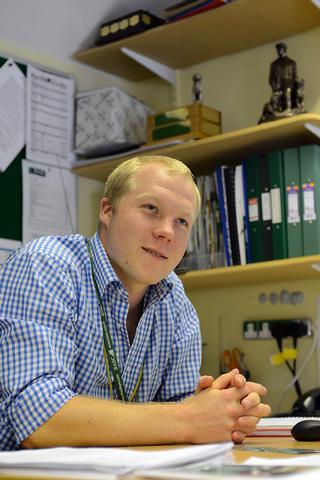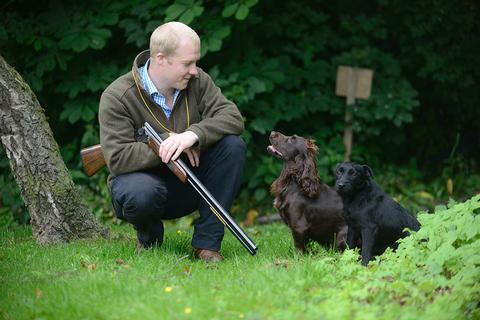Huw Lloyd


Q&A
Five minutes with… Game and Gamekeeping Officer Huw Lloyd
Countryside and Environmental Management student Huw Lloyd graduated in 2011 with a first class honours degree. Following a successful placement with the Game & Wildlife Conservation Trust, he is now a Game and Gamekeeping Officer for the British Association for Shooting and Conservation, based in North Wales.
How did your course prepare you for the workplace?
It gave me a very good knowledge of a large range of countryside management topics and issues such as agriculture, forestry, pollution, planning, ecology, access (public rights of way), etc. This also included the legislation surrounding each topic.
What has university done for you?
University life is just an awesome time, you meet friends for life and from the education point of view you get a very good ‘applicable’ degree with that all important work experience from your placement.
Was the placement year important when choosing where to study?
Yes, because I wasn’t particularly keen to do three solid years of academic studies and it broke up studying very nicely. I think people often forget that if you come out of school straight to college and then to university you will have six continuous years of studying and taking important exams. I always felt this was quite excessive particularly for practical people who just want to get on and work rather than do exams all the time. With a placement year it does break up the endless summers of exams.
How did you get your job?
It was advertised online and I went through two interviews and a spoken presentation. The modules I studied at Harper Adams such as forestry and planning gave me a good background knowledge which, when you enter the world of work, gives you a head start in comparison to many other people.
What sort of things do you do?
The best aspects of the job are getting out of the office and visiting different shoots to hold demonstration days or give advice. Day to day work includes replying to members’ enquiries or organising future gundog events, demonstration days or our attendance at game fairs.
What other jobs have you done?
On placement I was a research assistant. I worked for a tree surgeon after finishing my degree and then had a four-month contract with the Environment Agency conducting farm assessments for the Glastir Agri-environment Scheme in Wales. I really enjoyed this job because I would visit farms all across Mid and West Wales highlighting potential causes of pollution. From our reports the farmers could gain grants to address the issues so it was nice to be able to help farmers at the same time as stopping potential pollution incidents.
What advice would you give other students?
Get as much practical experience in different jobs as you can. Agricultural experience is very important because no matter what position you have in the countryside you will always have to deal with farmers. If you gain agricultural experience you will not only have a practical understand of farming but you will also gain respect from any farmer that you deal with in the future.
FIve minutes more… Huw on Harper Adams and his placement year
Why did you choose to study at Harper Adams?
It was the best university that I visited and a friend who went there 15 years earlier recommended it to me.
What were the best things about the course?
The variety of topics covered and the people on it.
What was the teaching and staff support like?
Very good. I found all of the lecturers very knowledgeable and, most importantly, friendly. I always felt that I could just go and have a chat to any of them.
And the facilities?
Also very good but in addition to the facilities on site the course also had some very good field trips which demonstrated practical examples of what was taught.
What are your favourite memories of university?
- Fresher’s week of course and all of the Summer Balls.
- The field trip to Slapton Ley towards the end of my first year. It was hard work but the weather was stunning and it was a good laugh. The sea was very cold though!
- As a group of friends (eight of us) we all went on holiday to the west coast of Ireland between the end of our exams and the summer ball at the end of our second year. It was a good road trip and was good to chill out after our exams.
- All of fourth year. Everyone complained about how much work we had but I enjoyed the whole year especially the Lions and dissy (dissertation) hand in.
What sort of things did you do on placement with the GWCT?
It varied through the year depending on the shooting season and the breeding season. Through the grouse season we would collect a sample of grouse from the shot ‘bag’ and do worm counts. We would also do some radio tracking of tagged birds (red grouse, black grouse & grey partridges) and catch up new birds to radio tag. We also carried medicated grit out across the moors to fill up grit boxes for the grouse which provided medication against strongylosis. In the breeding season we would do all sorts of bird and habitat surveys. It was great getting to know a new part of the country and learning so much about moorland management and grouse shooting.
Do you think placement enhanced your career prospects?
Yes because many jobs specify that you must have relevant experience and if you can combine your work experience from before Harper Adams with summer holiday work and your placement year it places you in a much better position than someone leaving university without that year in industry.
What does a BASC Game and Gamekeeping Officer do?
- Provides an informed and specialist point of contact for public bodies and relevant stakeholders, BASC members, gamekeepers and game shooters, the wider shooting and rural communities, and BASC staff.
- Develops and promotes defined services on relevant issues, such as contracts of employment, training and health and safety legislation, especially to members who are shoot managers or gamekeepers.
- Facilites delivery of the defined services.
- Helps to organise a network of volunteers in support of the defined services.
- Co-ordinates and responds to enquiries concerning game, game shooting and gamekeeping, as well as pest and predator control, including pigeon and rabbit shooting
- Oversees the BASC gundog programme activities
- Helps to organise the team’s presence at selected game and country shows and events.
- Updates the game and gamekeeping section of the BASC web site and Intranet.
- Contributes to the formulation of policy on game shooting, gamekeeping and game management issues.
- Contributes to work related to government consultations, as appropriate.
- Represents BASC at various liaison groups and other forums as required.
- Works in close consultation with other teams, including regional and country teams, as appropriate.
- Provides copy for in house magazines and the sporting press.
- Undertaking other tasks and projects as reasonably directed by the Head of Game and Gamekeeping.





